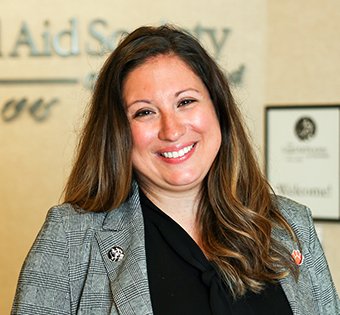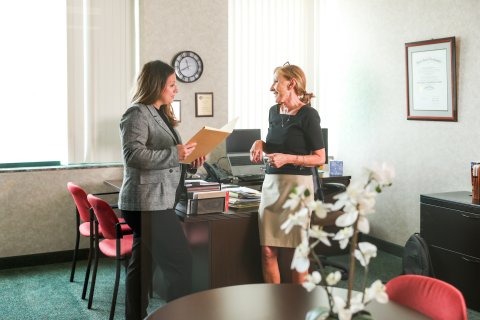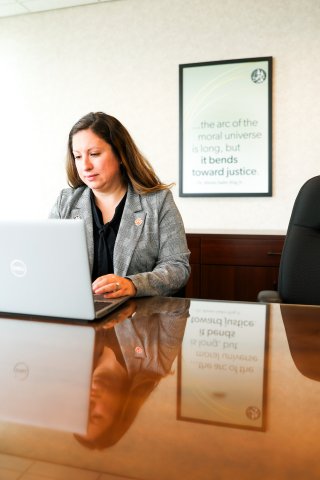
Managing Attorney, Lorain County, Legal Aid Society of Cleveland
For Ohio Northern University alumna Jennifer Kinsley Smith, BS ’10, JD ’13, practicing law isn’t about courtroom drama or chasing a big salary, it’s about restoring dignity and offering hope.
As a managing attorney with the Legal Aid Society of Cleveland, Jennifer encounters people at some of the lowest points in their lives. Her clients may be living in cars, struggling to feed their families, or failing to navigate a complex legal system to meet a basic need. Using her legal expertise, she helps them change the trajectory of their lives.
In her current role overseeing Legal Aid’s Lorain County office, Jennifer splits her time between the courtroom and the community. Whether she’s representing clients, supervising attorneys, or raising awareness about Legal Aid’s services, she’s driven by her core belief that every person deserves respect and a fair chance.
“If I can use my knowledge of the law to improve people’s lives, why wouldn’t I? she said.
Over her seven years at the Legal Aid Society, her passion for the work has only grown deeper.
“I can’t imagine working in an area outside of poverty law at this point,” she added. “For me, feeding, housing, and stabilizing families is the most meaningful way to leverage the law.”
In recognition of her outstanding contributions to vulnerable individuals and families in Northeast Ohio, Ohio Northern University is awarding Jennifer the 2025 William L. Robinson Young Alumni Award during this year’s Homecoming & Reunion Weekend.
Jennifer didn’t set out to become an attorney. A Presidential Scholarship recipient at ONU, she arrived on campus with dreams of becoming an athletic trainer. For her senior project, she engaged in research on football helmets and head injuries. The litigation issues surrounding this topic intrigued her, and ultimately led her to pursue her J.D. at ONU’s Pettit College of law.
After law school, Jennifer became an assistant prosecutor for the City of Cleveland. A few years later, she changed course and joined the nonprofit Legal Aid Society of Cleveland.
Serving five counties in Northeast Ohio, the Legal Aid Society of Cleveland handles nearly 8,000 cases every year for low-income individuals. Clients are never charged for the legal representation.
According to a recent study by the Legal Aid Corporation, 92% of low-income people who face civil legal issues can’t afford a traditional attorney, explained Jennifer.
“The justice gap is a significant and staggering problem,” she said.
Jennifer started her Legal Aid career representing individuals in acute psychiatric crisis at a psychiatric hospital in downtown Cleveland—a very niche area of the law.
When the hospital closed in 2022, she transitioned into public benefits law before stepping into her current leadership role in Lorain County. Now, she leads a team of attorneys, represents clients directly, and connects the broader community to the essential services Legal Aid provides.
Every client matters to her. She works tirelessly, often beyond normal working hours, to help her clients overcome the obstacles preventing them from obtaining their basic needs. But she’s even more passionate about the Legal Aid Society’s advocacy for systemic change.
“While I can put food on the table for families, case by case, by securing food stamps, we need to address systemically the fact that all these families in our county can’t afford food and don’t have access to affordable housing or childcare,” she said.
She’s especially concerned about recent and looming federal and state funding cuts to programs critical to low-income Ohioans.
“We are trying to educate and empower folks as to what these changes mean, when to expect them, and how to prepare,” she said. “It feels unprecedented what is coming down the pipeline.”
Jennifer credits her ONU education for providing the foundation upon which she built a meaningful career. By taking on leadership roles on campus, she learned how to handle interpersonal conflict and manage heavy workloads.
“ONU gave me a great education that let me write my own story,” she reflected.
And the story she is writing is making a difference—one person at a time.
“There are a lot of losses in this line of work; and those days are hard,” she said. “But those days when I close my laptop at the end of the day and know that a family is now going to eat or have a place to stay or have access to needed medications, that’s what keeps me coming back.”

